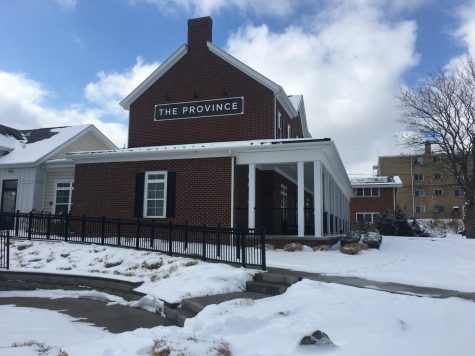Regional campuses provide lower costs
Natalie Lucas, who attended Kent State’s Stark Campus for two and a half years to save money on tuition. Lucas transferred to the Kent Campus later to finish her degree.
May 2, 2018
Graduating college debt-free is unlikely for some students.
Not for Kent State graduate Natalie Lucas.
Lucas is a Jackson Township native who attended Kent State Stark for two-and-a-half years to save money, then completed her degrees in business administration and accounting at the Kent campus. Lucas is graduating debt-free in May with a Master’s degree in accounting.
Lucas had to complete the remainder of her degree at the Kent campus, as only 20 degrees can be fully completed at the Stark campus.
“The Stark campus was 10 minutes from my house, and the cost was the biggest factor,” Lucas said. “I had toured Stark and really liked the campus and that the classes were smaller compared to here (Kent).”
Funding played an important role in Lucas’ ability to graduate without debt.
“Apply for scholarships,” Lucas said. “Even at the Stark campus and at main, a lot of the times you hear faculty and administrative staff saying if people would apply for them, it is most likely theirs because they have such trouble getting students to apply for scholarships.”
Lucas’s brother, Ryan, is a theatre technology major attending the Kent Stark campus as a way to save money just like his sister did. He will make the 45-minute commute to the Kent campus in the fall, as Stark does not provide all the courses necessary to complete his degree.
Should students struggling with money consider attending a regional?
For an in-state freshman student taking 12-18 credit hours, attending a regional campus could potentially save them $2,174. At the Kent campus, being a full-time student costs a total of $5,006, while attending a regional campus full-time costs $2,832.
Money is an important factor to consider when making a college choice said Vice President of System Integration Nathan Ritchey.
“If a person is really struggling with finances, I would recommend a student really talk with advisors on the Kent campus, and weigh their options with a regional campus that is close to home and make an informed decision for what is best for them,” Ritchey said.
Kent State also offers programs to help students budget their money and pay off loans after graduation.
“At our Stark campus, we have a program that we call ‘Save Your Raise’ that we roll out to our (First Year Experience) courses as well as various orientation outlets or presentations for incoming students,” said Amber Wallace, the assistant director for financial aid. “We talk about needs versus wants. Is Starbucks essential, maybe not, but coffee may be essential for some students to make it through their degree. We talk about ways that they can still live, but do it practically and on a budget.”
At Stark’s Student Professional Development Conference, a presentation called “Life After Loans” is put on to discuss student debt.
“We review what you do with a salary of $30,000 or $50,000 once students complete the degree and how to manage paying student loans and having your own apartment,” Wallace said. “A lot of students don’t realize there are more options to pay back their federal loans than the standard repayment that is presented. Some students that are going into the education or the health field may find that there are loan forgiveness opportunities.”
Regional campuses offer involvement opportunities
Lucas felt very involved at the Kent State Stark campus, as she was involved with the campus’s Undergraduate Student Government.
“In USG, I helped plan all of the campus events,” Lucas said. “The campus does a spirit fest in the fall and Kentiki, their end of the year celebration. I also helped with any of the resource fairs on campus. With the help of USG, we also started a food pantry on campus.”
The regional campuses also provide students with tutoring opportunities. Lucas is currently a tutor at Stark, helping students taking business courses and prepare them for the transition to the Kent campus.
“I really enjoy being able to help others and helping them understand the material so that when they get to here (Kent campus) they aren’t as overwhelmed or have a good grasp of going into the class,” Lucas said.
The Stark campus offers free walk-in tutoring for all levels of math courses. Students can additionally request tutoring in any subject area, and a qualified tutor in that subject will be assigned to them.
Regional professors are taught by approved faculty
At all the Kent regional campuses, classes are taught by resident faculty. All professors are full-time tenure track Kent State approved faculty.
“I went to Kent as a graduate student and I was a teaching assistant and sat in the big freshman Kent core type classes,” said Mary Southards, the assistant dean for Enrollment Management. “There is a world of difference between being in those big classes and being taught by a graduate student or being in a class of 25 or 30 taught by a full-time professor.”
Kent State believes every student regardless of the campus should and do have access to expertise in their disciplines, Ritchey said.
“Faculty members have to go through review, review processes, renewal and promotion,” Ritchey said. “There are some serious standards that are applied to them as a member of the Kent State faculty.”
During Lucas’s time at the Stark campus, she felt that the faculty made a point to make students feel involved.
“I really think the professors cared a lot and they really helped me grow as a person, and really helped me understand the concepts they were teaching,” Lucas said.
All graduates receive a Kent State University degree
No matter if a student attends a regional campus, the Kent campus or both during their collegiate years, all students will graduate with a Kent State University degree rather than, for example, a Kent State University at Stark degree.
“In fact, I would say that Kent State University with all of its parts is one university,” Ritchey said. “To me, it wouldn’t make sense that there would be different degrees offered by various pieces of Kent State. Really to be consistent, develop standards and uphold the standards absolutely makes sense that our degrees are consistent across the campus.”
Some regional campuses offer unique degrees that cannot be completed at the Kent campus.
The music technology program is exclusively offered at the Stark campus, and is currently one of the fastest growing programs at the regional.
The veterinary technology program is only offered at the Tuscarawas and Trumbull campuses.
Brynn Pennell is the regional campuses reporter. Contact her at [email protected].
























